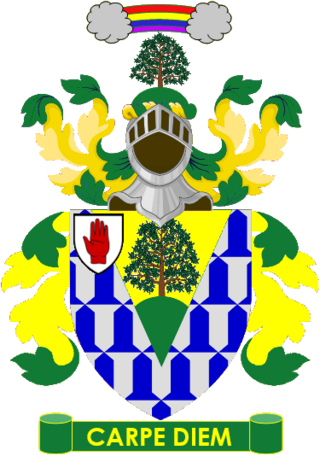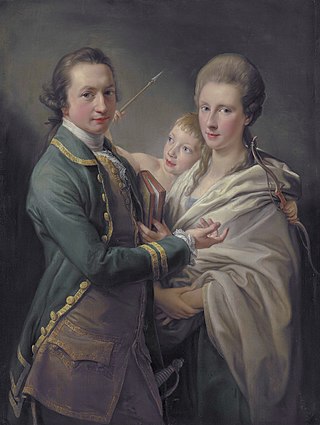
Marquess of Bath is a title in the Peerage of Great Britain. It was created in 1789 for Thomas Thynne, 3rd Viscount Weymouth. The Marquess holds the subsidiary titles Baron Thynne, of Warminster in the County of Wiltshire, and Viscount Weymouth, both created in 1682 in the Peerage of England. He is also a baronet in the Baronetage of England.

Marquess of Anglesey is a title in the Peerage of the United Kingdom. It was created in 1815 for Henry Paget, 2nd Earl of Uxbridge, a hero of the Battle of Waterloo, second in command to the Duke of Wellington. The Marquess holds the subsidiary titles of Earl of Uxbridge, in the County of Middlesex, in the Peerage of Great Britain (1784), Baron Paget, de Beaudesert, in the Peerage of England (1553), and is also an Irish Baronet, of Plas Newydd in the County of Anglesey and of Mount Bagenall in the County of Louth.

Baron Monson, of Burton in the County of Lincoln, is a title in the Peerage of Great Britain. It was created in 18th century for Sir John Monson, 5th Baronet. The Monson family descends from Thomas Monson, of Carleton, Lincolnshire. He sat as Member of Parliament for Lincolnshire, Castle Rising and Cricklade. On 29 June 1611 he was created a Baronet, of Carleton in the County of Lincoln, in the Baronetage of England. His eldest son, the second Baronet, fought as a Royalist during the Civil War and also represented Lincoln in the House of Commons.
Baron de Mauley, of Canford in the County of Dorset, is a title in the Peerage of the United Kingdom. It was created on 10 July 1838 for the Whig politician the Hon. William Ponsonby, who had earlier represented Poole, Knaresborough and Dorset in the House of Commons. He was the third son of the 3rd Earl of Bessborough, an Anglo-Irish peer, and the husband of Lady Barbara Ashley-Cooper, one of the co-heirs to the ancient barony by writ of Mauley, which superseded the feudal barony the caput of which was at Mulgrave Castle, Yorkshire, which barony by writ had become extinct in 1415. His son, later the second Baron, sat as Member of Parliament for Poole and Dungarvon.

Baron Annaly is a title that has been created three times, twice in the Peerage of Ireland and once in the Peerage of the United Kingdom. Annaly is named after the ancient term for the general locale, which in turn was named after the original ancient king. The third creation is currently extant.

Sir Frederick Arthur Gore Ouseley, 2nd Baronet was an English composer, organist, musicologist and priest.

Thomas John Hamilton FitzMaurice, 5th Earl of Orkney was a Scottish aristocrat.

The Wigan Baronetcy, of Clare Lawn in Mortlake in the County of Surrey and Purland Chase in Ross in the County of Hereford, is a title in the Baronetage of the United Kingdom. It was created on 9 March 1898 for Frederick Wigan, a Director of the North London Railway. The presumed 6th Baronet, listed in Debrett's Peerage (2015) as the son of the 5th Baronet, has not successfully proven his succession and is consequently not on the Official Roll of the Baronetage.
There have been three baronetcies created for members of the Gore family, all in the Baronetage of Ireland. All three titles are extant. The family also holds two earldoms and a barony.

Arthur Saunders Gore, 2nd Earl of Arran, KP, PC (Ire), styled The Honourable Arthur Gore from 1758 to 1762 and Viscount Sudley from 1762 to 1773, was an Irish peer and politician.
There have been six baronetcies created for persons with the surname Brooke, one in the Baronetage of England, one in the Baronetage of Ireland and four in the Baronetage of the United Kingdom. As of 2015 four of the creations are extant, though one has been subsumed into a peerage.
There have been four baronetcies created for persons with the surname Temple, two in the Baronetage of England, one in the Baronetage of Nova Scotia and one in the Baronetage of the United Kingdom.
Three baronetcies were created for persons with the surname D'Oyly, two in the Baronetage of England and one in the Baronetage of the United Kingdom. One creation is extant as of 2008.

The Wraxall Baronetcy, of Wraxall in the County of Somerset, is a title in the Baronetage of the United Kingdom. It was created on 21 December 1813 for Nathaniel Wraxall. He was in the East India Company Civil Service, an author and member of parliament for Hindon, Ludgershall and Wallingford. His grandson, the third Baronet, was an author.

The Elton Baronetcy, of Bristol, is a title in the Baronetage of Great Britain. It was created on 31 October 1717 for Abraham Elton, Mayor of and Member of Parliament for Bristol from 1722 to 1727. The second Baronet was also Mayor of Bristol and represented Taunton and Bristol (1727–1742) in the House of Commons. The seventh Baronet sat as Liberal Member of Parliament for Bath. The eighth Baronet was High Sheriff of Somerset in 1895. The tenth Baronet was a pioneer of the British documentary film industry.

There have been two baronetcies created for persons with the surname Goring, both in the Baronetage of England. The second creation came into the family through a special remainder in the patent creating the baronetcy. Only the latter creation is extant as of 2008.

Sir Andrew Agnew, 8th Baronet DL was a British politician and baronet.

Sir George Orby Wombwell, 4th Baronet was a British baronet.

Sir Charles Abraham Elton, 6th Baronet was an English officer in the British Army and an author.

Earl of Arran is a title in the Peerage of Ireland. It is not to be confused with the title Earl of Arran in the Peerage of Scotland. The two titles refer to different places: the Aran Islands in Ireland, and the Isle of Arran in Scotland. The Irish earldom is held by the Gore family. The Scottish earldom is a separate title, held as a subsidiary title of the Duke of Hamilton.













